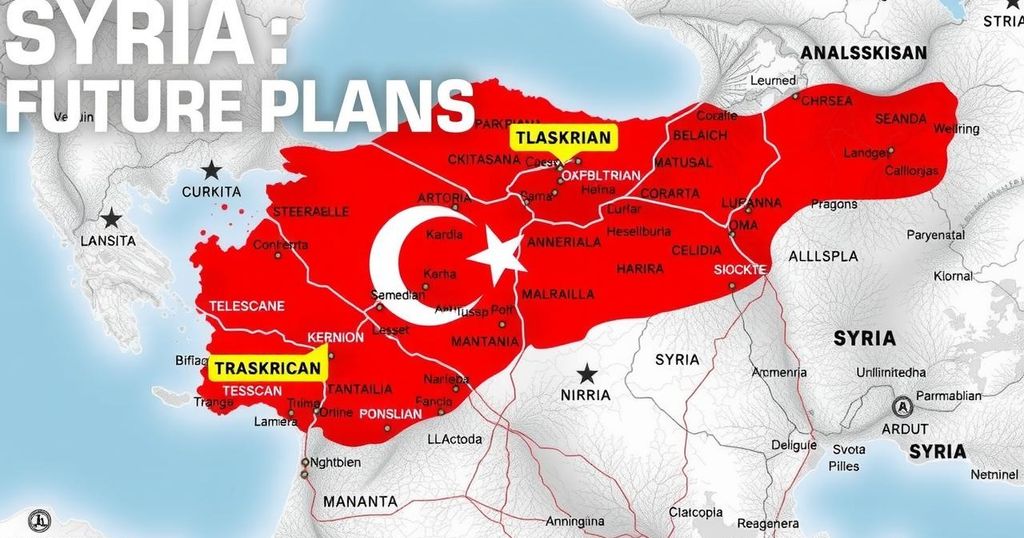World news
AHMED AL - SHARAA, ANKARA, ASIA, ASSAD, BASHAR AL - ASSAD, DONALD TRUMP, EUROPE/ASIA, FIGHTER JETS, HAY ' AT TAHRIR AL - SHAM, HEZBOLLAH, IDLIB, ISRAEL-HAMAS CONFLICT, ME, MIDDLE EAST, MIDDLE EAST AFFAIRS, NATIONAL COALITION FOR SYRIAN REVOLUTIONARY AND OPPOSITION FORCES, NORTH AMERICA, PALESTINE, RUSSIA, SYRIA, SYRIAN, SYRIAN CONFLICT, TURKEY, UNITED STATES, WAR
Sofia Rodriguez
0 Comments
Turkey’s Pivotal Role in Shaping Post-Assad Syria
Turkey has emerged as a significant force in Syria following the rapid downfall of Bashar al-Assad’s regime. The swift capture of Aleppo has altered the landscape of power, with Turkey pushing for dialogue among opposition factions and the Syrian government. Key objectives include establishing a transitional government, managing refugee returns, and countering the influence of the Syrian Democratic Forces in the region while leading efforts for reconstruction.
The recent collapse of Bashar al-Assad’s regime in Syria has taken Ankara by surprise, although Turkish officials had anticipated his downfall in the long run. The swift and unexpected capture of Aleppo further consolidated Turkey’s influence within Syria, as Turkish-backed opposition forces launched an extensive campaign that quickly overtook key areas. Turkey is now positioned as a crucial player in negotiating future governance while emphasizing the importance of dialogue between the government and opposition to maintain Syria’s institutional framework.
Khaled Khoja, former president of the National Coalition for Syrian Revolutionary and Opposition Forces, noted the pivotal influence Turkey has exerted throughout the operation, marked by effective leadership from Turkish officials. Concurrently, Turkish Foreign Minister Hakan Fidan has adeptly navigated relationships with Russia in fostering a framework for a new Syrian governance model.
Turkey’s objectives include facilitating reconciliation among Syrian opposition factions and establishing a transitional government that encompasses diverse political voices. Building on its experiences in northern Syria, Turkey is expected to support governance initiatives directly and provide crucial technical assistance.
Turkey’s strategic goals also encompass the management of the Syrian Democratic Forces (SDF) presence in the region, which complicates the resource landscape significantly. The potential for negotiations between HTS and the SDF over resources exists, but Turkey regards the SDF’s influence in predominantly Arab regions as unacceptable and may consider military options to mitigate this control.
The eventual return of Syrian refugees remains a priority for Turkey, particularly as conditions in regions such as Aleppo begin to stabilize. Efforts to establish logistical connections among key areas are underway, and the gradual repatriation of refugees will hinge on the restoration of security and infrastructure. Turkey is anticipated to spearhead reconstruction initiatives, with aid from Islamic organizations and Gulf nations likely playing a pivotal role.
Ultimately, the trajectory of Turkey’s involvement in Syria is intertwined with efforts to create a stable and representative transitional government, address the needs of displaced populations, and manage significant resource distribution challenges in the aftermath of the Assad regime’s decline.
The document discusses Turkey’s evolving role in Syria following the rapid downfall of Bashar al-Assad’s government. It provides insights into Turkey’s military operations, diplomatic maneuvers, and the implications for governance and reconstruction efforts in post-Assad Syria. The context encompasses the geographical dynamics of various armed factions, Turkey’s strategic priorities surrounding the Syrian Democratic Forces, and considerations for the repatriation of Syrian refugees. The involvement of international players such as Russia and the United States also intertwines with Ankara’s objectives, highlighting regional complexities.
In summary, the recent developments in Syria have positioned Turkey as a leading force in shaping the future of the region post-Assad. With strategic military operations and a focus on establishing a representative governance structure, Turkey aims to reconcile various Syrian factions while managing the critical issues of resource control and refugee repatriation. Moving forward, Turkey’s role in reconstruction efforts and its relations with regional and international actors will determine the sustainability of its influence in the ongoing Syrian crisis.
Original Source: www.middleeasteye.net




Post Comment